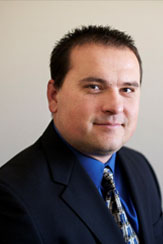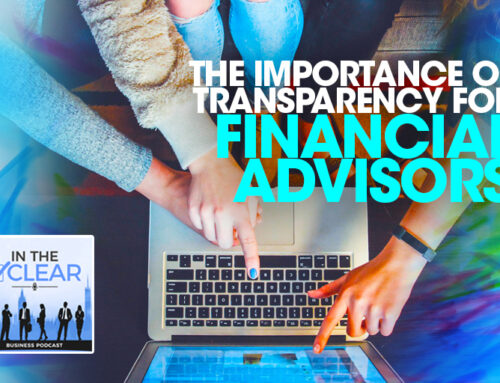 Daniel Ameduri is the editor of the Wealth Research Group and the cofounder of Future Money Trends Letter, FMT Advisory and Crush The Street.
Daniel Ameduri is the editor of the Wealth Research Group and the cofounder of Future Money Trends Letter, FMT Advisory and Crush The Street.
In this episode, we talk about the outdated techniques in the personal finance world. He tears down the veil of a few topics that we all have been taught to do as mature adults, like financial advisors and 401ks. He also provides some tips and resources on finding a great financial advisor to entrust your money with.
Hello, everyone. This is Tonya Dawn Recla. This is the In The Clear podcast. I’m really excited to have with me today, Daniel Ameduri. If you go back and listen, I also interviewed one of his partners, Lior Gantz a while back. These guys are doing some really remarkable stuff in the finance industry. As you all know, we’re not shy about pointing fingers at the finance industry for being wrought with frauds and scams and some less than savory business practices. I love getting a chance to bring these guys on and talk about some of their approaches to this. Really, in my opinion, kind of tearing the shroud and the veil off of some pretty outdated techniques in that world. I love their approach and I’m really excited about having Daniel here talking about Future Money Trends, which he’d been up for seven years. Then he can introduce a new concept that they recently launched. Please join me in welcoming Daniel to the show. Welcome, Daniel.
Thanks for having me on the show.
Absolutely. Thanks for joining us. As you know, we like to talk about transparency and how to raise the bar in some of these industries. Tell me a little bit about your approach in the finance industry. It feels really unique.

We consider ourselves personal finance for the new economy.
We consider ourselves personal finance for the new economy. We really try to focus on, first off, offering people the opportunity to make those decisions for themselves. We give them the information, we give them the same thing that a broker or a financial advisor might see. Most people think that a financial advisor might have gone through some four year degree program, but actually most listeners would be shocked to learn that it actually takes more training to cut hair and get a license to cut somebody’s hair at a salon than it does to become, I’m being serious, than it does to become a financial planner.
Now we understand the problem in that industry.
In the finance industry, my goodness, it’s littered with mines, with bombs out there. For the most part, it’s commission based but also there’s something where people don’t even realize, when you go to a 401K, your financial planner puts you in an Oppenheimer Fund or Fidelity Fund, which you don’t realize is the reason, for the most part, it’s going to those people is because the Oppenheimer guys are sending his family to Disney cruises and making sure he gets better pay on the backend. There’s a lot of that going on.
There is something called the fiduciary, which if you are going to get a financial advisor or planner to help you out, I would strongly encourage everybody get a fiduciary. A fiduciary is about that 3% to 4% of all financial advisors. They actually are the only ones that truly have to be transparent to such an extreme that if your fiduciary bought, let’s say, IBM, it’s a familiar stock to everybody, in the morning and then you call them up and wanted to buy IBM by lunch, they actually are legally obligated to give you the better price. If they perhaps bought it for $100 and you bought for $102, they actually have to swap those shares that they bought with yours and give you that price point. A fiduciary is definitely the most transparent possible person you can have if you’re going to use a financial advisor.
Wow, that’s awesome to hear. That’s why I love talking to you guys. That’s really valuable to know. Folks, we like to give you feedback on what questions you should be asking. In my opinion, that’s probably one of the first questions you should be asking, “Are you a fiduciary?” I hadn’t heard that before so I really appreciate that insight. I want to go back to what you’re talking about, about giving people information, allowing them to make their own decisions, which we’re also big fans of. Do you offer services as well for the folks, like me for example. I love getting information, I like being knowledgeable. At a certain point, I also want that trusted person that I can turn some of that over to and outsource. Do you all provide that?
We do have an advisor we recommend. His name is Nicholas Green, he’s in Phoenix. The website is FMTAdvisory.com. Again, that is who we refer to. We have some ownership in the company. The fiduciary actually is the senior owner. He’s been doing this for ten years. By law, he is obligated to give you the best deal. I think that’s a great question to ask anybody that you’re going to give your money to. With that said, at the Future Money Trends letter, we don’t necessarily recommend everybody get in the stock market. In fact, that’s one of the things that we think is the biggest secret in the financial industry. Everybody feels like they earn money, they’ve got to reallocate it immediately to something, reallocate it to the stock market, reallocate it to some sort of mutual fund.
That’s not necessarily the case because the fact is, most people, they don’t understand what they’re buying. If you don’t understand what you’re buying, what are you doing? It comes down to personal finance 101. Majority of the income that you’ll make throughout your life is going to be from you. You’re your best investment. When you look at where your money actually comes from, it’s the person in the mirror. For some reason, we’ve all been conditioned to reallocate our money to other people who happen to earn a living off of taking our money. Really you’re the first and the last line of defense for your money ultimately. Some of the best investors like Warren Buffett and Jim Rogers have said this. Sometimes the best thing to do is nothing. There’s nothing wrong with having some cash. You’ll sleep well at night.
I like that. I really like that you’re willing to call some of that out because it is an industry. We see this a lot in maybe the tech industries for business owners or finance industry for businesses and for personal. It just is so overwhelming that people get really intimated in that space. I think the best advice for folks out there is educate yourself a little bit and just start to feel into what feels right, what works for you. Ultimately, I think a lot of advisors in this arena don’t stop to ask somebody what do they want. What life do you want to have? How easily accessible do you want your money? All of that stuff. I appreciate that you’re sharing that.
I want to go back to this fiduciary thing. Because in our world, one of the biggest issues we run into is we encourage people to vet people before they get involved with them in their business. A lot of times, what happens is we’ll have clients who bring people to us over and over and over again, they’re finding these scammy people. We’re the bearers of the bad news, “Nope, you picked a bad one again.” They get frustrated, they’re like, “Just tell us who to work with.” I can see folks in the finance side of things feeling similarly, that if the fiduciaries are such a small portion of the financial planner world, other than the gentleman that you recommended, how do people go about finding them? Is there a special secret place to hang out? Where do they go?
There is a fiduciary’s association that you can find. You can find fiduciaries in your area. I’m sure people could find it by googling fiduciary and their city or the next major city next to them, they could find a fiduciary advisor. I know Tony Robbins, the motivational speaker, he has a company that’s a fiduciary company that he actually is a partial owner in. There are some good fiduciaries out there. Everyone should take the seriousness of handing money over to somebody and respect their money with what your hard earned dollars deserve by asking these people, first and foremost, “How long have you been in business? I’d like to have three referrals.” If they can’t give you three referrals, I wouldn’t do business with them. These people have been doing business for five and ten years, they should have three people you can call that are non-family members and ask them what is it like, what is it like working with this person and how has your experience has been.

Personal Finance: Be very clear that your financial advisor understands your own needs.
Also, making sure that the person just isn’t putting it into some sort of cookie cutter program. Something that caters to you. Be very clear that they understand your own needs. Perhaps you don’t want the money to be locked up. A lot of people say that they’ll take moderate risk until something goes down 10% and then they don’t want to be moderate risk, they want to be more conservative. There’s other alternatives out there for you. A lot of things that are advertised to the rich, like whole life insurance policies or specific kinds of real estate investment trusts, these things are advertised to the rich but they’re not really advertised to the middle class. The middle class keeps getting thrown at mutual funds with these huge enormous fees that take over a third of your gains over the course of 20, 30 years.
60 Minutes has done an excellent show on this that you can find on YouTube about 401Ks, they did about two years ago. They’re showing that people are getting feed to death. Behind the upfront fee, there’s anywhere from 18 to 21 hidden fees. You just got to be very careful with your money and not so easily just give it to anybody, especially if they’re just a financial planner. Again, these are probably good people, well intention people, but they’re really are salesmen. These are not investment advisors.
That’s so funny. I was just going to say, I bet you have some pretty strong opinions about company 401K plans?
I’m not a fan, to be perfectly honest with you. For the most part, the 401K companies that are approved, these are the companies that are these big corporate donors. They’ve weeded out the competition. They’re very high in fees. Now they have these new things which are target funds, which are even more dangerous. Many people, even in Congress, have come out against these things now that they’ve seen them actually play out here for the last ten years. I’m not a fan overall of the 401K for many reasons. I don’t know if we want to get into all of that.
The 401K, if you’re getting a company match, sure, it could be worth it. You get 100% return from day one, that’s not a bad deal. You can just own some blue chip US stocks. Overall, at Future Money Trends we’re not, only because I don’t like for younger people locking that money up. You have to pay a fee if you want to get your own access to your own savings. You’re very limited to how many investments you can make. On the finance side, the fact of the matter is, the whole idea of a 401K is you’re going to defer taxes so you can take taxes out at a lower tax rate when you’re 65. Look, at Future Money Trends, and I think for most people, I don’t think the plan should be to fail. Why would I plan to be in the lowest possible tax bracket? My plan is, at 65, I’m going to be in the highest possible tax bracket.
Gosh, you’re such a breath of fresh air. I love it. That’s the thing, the responsible message, especially for the middle and lower class, is that you follow the rules and you do this and people pat themselves on the back because they’re doing the responsible, mature, adult thing because that’s what we’ve been told to do. Wait a second, who made these rules? I think ever since I was born, I’m always the one going, “Wait, wait, wait. Who’s behind this? What do they serve to gain from this?” We tell our clients all the time, “Follow the money.” If you really want to know who stands to gain from this stuff, follow the money. We can talk about the medical industry all day long. Everything that we’re taught to do as mature, responsible adults is usually funding somebody else’s dream.
Very true.
I really appreciate you doing that. I think what you guys do is awesome in terms of offering information. I’m sure you find a lot of what we find. We educate, we provide content, we provide training, over and over and over again. I think that for the majority of people, it’s just so overwhelming. I think this information age that we’re involved with, the biggest challenge is making yourself standout as somebody who can be trusted and where people can go. How do you all manage that process, to just tell people, “Hey, look. All of that noise over there, here’s why you should be coming to us for this”?
There is a lot of noise out there, in the markets, with the publishing industry. We just try to give people brutal honesty and say, “Here are your options. Here are options that nobody’s really talking about.” I also tell them what I’ve done with my own finances. “My wife and I, we saved, we were frugal.” I give them extreme savings ideas. I got tired of clicking on articles that tell you how to save money, it’s like these three basic ways. I like to give people, “Here’s how you cut into the bone.” By the time I was 30, I had already become, as far as a net worth millionaire, and then later became a multimillionaire. I’m still in my 30s. I just basically lay it out for people, “Here’s how I did it. There’s no two roads alike, but I’ve happened to notice that when I read about other people who become financially independent, that there are definitely some common denominators.”

Personal Finance: It’s one thing to rely on mentors or experts, but it’s another thing just to follow the conventional plan.
The biggest common denominator is, of course, trusting themselves and looking to themselves for many of the answers they’re researching. It’s one thing to rely on mentors or experts, but it’s another thing just to follow the conventional plan. Because the conventional plan, it’s definitely not a plan. If you do that, “Let’s just retire in 40 years,” that is what you’re going to get. It’s an experiment too. 401Ks were not around when Adam and Eve were around. A lot of people think the 401K was around forever. The 401K has been around since the 80s. It was passed in Congress in the late 70s, it’s been around since the 80s. Only now are we seeing this experiment come to fruition. According to a lot of articles and studies and research by even the mutual fund companies, the 401K is not working out. I just read an article yesterday JP Morgan put out where they’re recommending that, “Hey, this is not going to work.” They’re at least advocating for some sort of mandatory government run retirement system, even beyond social security, because the 401K is not even coming close to doing what I think people had anticipated. This is all an experiment.
The whole 65 year old thing, it’s a hilarious story. You research it and go back to when they created social security in the 30s. They literally were sitting around, having a conversation. First off, the men were dying off at about 58 years old. The women were dying off at 62. This social security plan that we all have now was really meant for the worst case scenario. If you outlived your life expectancy. Anyway, the story goes is they were sitting around going, “Hey, why don’t we do social security at 62?” Then somebody said 67. Then they’re like, “Hey, 65 sounds about right.” There was no study, there was no in depth research with life insurance companies. Somebody just picked the number. That now is essentially our retirement year.
That’s it. That’s the magic number. I can honestly say you’re the first person on this show to mention Adam and Eve. That’s impressive. To tie it into finance, that’s creative. I could talk to you guys all day and pick your brains and everything. I really appreciate your approach to this. I know I’ve said that a few times now. Folks out there, ask yourself, whose plan are you following? I think that’s the heart of what the Future Money Trends guys are all about, is really just think for yourself. What works for you, what works for your family? I love that you said there aren’t any two paths the same. It truly is. You can create it however you want it to be. Get clear on that, and then go about finding the people who can help you get there.
The same is true in business, we advise businesses all the time. Where do you want to go? There’s a million and one ways to do business these days. How do you want it to look? And then go looking for the individuals who can help you with a specific piece of that. There’s nobody who can tell you how to walk your path, it’s impossible. It’s your path. I think that can be applied to the finance game as well. I, for one, love the diversity of the stuff that you’re talking about. I think it’s important to shed light on the fact that there are a lot of vehicles to help you get there. How do you work? Do you work with clients? Do you do trainings? Do you just manage the website? What do you do?
Future Money Trends is subscription based. The subscription is free. The ways the website generates revenues is either through affiliate marketing or just regular ads on the websites. We have ads generation, which is your Google Ads and different ads, we also have mining stocks that sponsor our website that we vet. We have advertisers who pay for the website, which is generated from the website traffic. The subscriptions remain free for users and it also keeps us with a nice relationship with our users, that I’m not accepting any money from them and they’re allowed to come and go as they please and read our newsletter for free.
However, with that said, we have recently launched a new website and it’s PermanentWealthPartners.com. There’s a special link if anybody wants to check it out, PermanentWealthPartners.com/Wealth. What this is, I wanted to start a paid newsletter. There are many out there, but all of them have the same issue that all of the financial people have. Everybody is either making a living off of their paid subscribers or they need the paid subscription, they’re constantly promoting it and it turns into spam in your inbox and they’re constantly trying to upgrade you. Over the summer, what I did is I approached somebody who had made over $100 million, they had built $2 billion companies. I said, “I think there’s a hole in the market for some unbiased advice in these microcap companies that people can make a lot of money from.” They’re just too risky because the microcap space or penny stocks, they are honestly 95 plus percent fraud and it’s a huge scam.
I approached Keith Neumeyer. He’s a very successful entrepreneur. I said, “I know you don’t care about the money, but what if we started a paid letter? It’s something that Future Money Trends people could upgrade into if they wanted to basically invest in what you invest?” I said, “All you’ve got to do is tell us, when you’re about to buy a stock, send out an alert, let us know and let us know why. Then every month, we’ll do an interview with you and get an update on these stocks.” For people who are looking for riskier plays, speculative plays, certainly this is not where your retirement fund should be going. But if you’re looking to have a little fun in the markets, rather than just take some newsletter writers, a guy’s opinion, we’ve simplified the whole thing.
Here’s somebody who’s been doing this for over 30 years, he’s made hundreds of millions of dollars, he’s helped other people make millions of dollars. We’re not asking them for a pick a week, a pick a day. I told him, “What do you do?” He said, “I’m only going to buy about three or four stocks this year.” I’m like, “That’s fine. Then we’ll just do three or four stocks with you.” Just simplified and clear. Because everybody, a lot of people are interested. Penny stocks is still one of the most popular search phrases on Google. We all want to speculate on these things, but I’d like to take out the uncertainty of the whole thing because what’s behind every penny stock is their shareholders. You’re either an insider or you’re not. That’s our new website that we’ve launched that has a paid membership. That’s PermanentWealthPartners.com/Wealth. That’s what Keith Neumeyer as the sole person who picks the stocks.

I’ve managed to get out of this river where everybody is either grinding out ten hours a day with no hope. Now, I’m just trying to help people out.
Otherwise, Future Money Trends. My goal is to help others. I feel like I’ve managed to get out of this river where everybody is either grinding out ten hours a day with no hope. Now, I’m just trying to help people out. I feel great. I wake up every day, I’m with my wife and three children. I work from home and I do what I want. Since I was a little boy, I’ve been reading about personal finance. Now, every day I read about personal finance. If I see a good idea, I love sharing it. I killed two birds with one stone. I’m constantly looking for income ideas for myself, and as I find them I’m able to act on them myself, share them with the Future Money Trends subscribers.
Awesome. We’re fans of what you guys are doing. I appreciate you coming on the show and just sharing your insights and being so transparent. That’s a big deal in that industry. I appreciate that you’re modeling that and raising the bar by calling people out. I think it’s time. We like what you’re doing. You’ve mentioned a few of your websites, is there anywhere else you’d like for us to send people to go check out your stuff?
Future Money Trends is the easiest. It sounds like you guys have already to Lior at Wealth Research Group. FutureMoneyTrends.com, if you go there, that’s the best place. On the website, we have links to other letters, as well as the FMT Advisory.
Awesome. Thank you so much for joining us today on the show, Daniel.
Thanks very much.
Absolutely. To all of you out there, thank you. Make sure that before you make any decisions for your business, that you are in the clear. Take care everyone.




